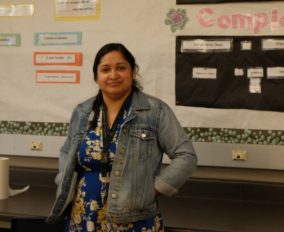
Wyatt Virag
“Our country was built on diversity. If you get rid of diversity in your textbooks, you don’t actually know that. You think that this country was built on the idea of white men. In Florida, the textbooks are even being censored. The way you as students are taught to perceive the world, it’s homogenized, it’s not real.”
In Shawn Nguyen’s sophomore English class, students are reading Ray Bradbury’s “Fahrenheit 451,” connecting the text with current political events. The dystopian novel follows the life of Guy Montag who lives in a world where books representing diverse perspectives are banned from the public and are to be burned by “firemen.”
The government’s reason for this was to make everyone think the same way in hopes that it would keep them happy. The book’s concept was inspired by books being burned in Nazi Germany.
After Montag quits his job as a fireman, he realizes that preserving and learning from books can make radical changes and differences among the people.
Today’s version of burning books might look like certain books being banned in schools and states. Book bans in some U.S. schools and states have existed for decades.
This act is similar to the book burning in Bradbury’s novel, leading to one of Nguyen’s students making a connection between the text and real life.
“In Florida, they don’t even let them teach race and society. We have a class like that. Or world literature, the textbooks are very censored in parts of the United States,” said Nguyen.
By censoring educational textbooks to students, they do not get the chance to fully understand history. The teaching of history and literature is not supposed to be from only one perspective.
While banning books is different from physically burning them, both actions restrict public access to certain ideas. Both have the same purpose: the outcome is a less educated, more single-minded society.
“I had the students come up with examples of real life homogenization and they all agreed that when they do that, we lose diversity and culture,” said Nguyen.
Important pieces of literature have never been created to appease all groups of people. Reading is supposed to teach and make people think, reflect, and sometimes take action. Book bans limit the range of perspectives and ideas available to readers, particularly in educational settings.
“The novel is our reality and the students are slowly starting to see that. That’s the whole purpose of reading the novel,” said Nguyen.